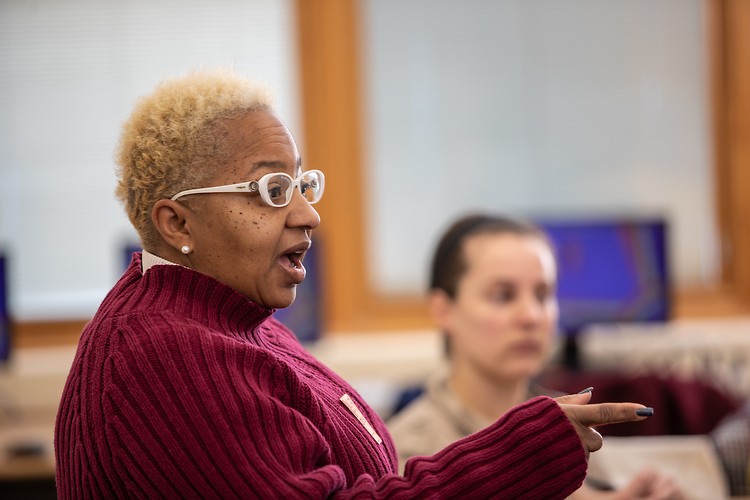Earlier this year, the Kent County Food Policy Council launched to strengthen and grow the food system in Kent County. As we build momentum, discuss, and prioritize issues, we are gathering information and engaging with our community through a project called Everybody Eats: Highlighting Food Experiences in Kent County. Through this project, we are inviting our community to share their experiences with our food system and highlight the good food work that is already happening here.
Below is an interview with Lisa Oliver-King, Director of Our Kitchen Table (OKT), a grass-roots, nonprofit organization serving greater Grand Rapids. OKT promotes social justice and empowers our neighbors to improve their health and environment through information, community organizing and advocacy. Lisa was a formation team member of the Kent County Food Policy Council. Thank you, Lisa, for your good food work and sharing your thoughts with us!
Tell me about your relationship with food.
Lisa: My relationship with food has been built over time. As a child, my mother would prepare different meals for my siblings and I so that we could eat what we really wanted to eat, sometimes she would make each of us a different meal. During the holidays, my family would be up until 3 or 4 in the morning making everything from scratch. My family always really bonded over food. We also had hard times. At one point, the gas in our house was shut off for a week so we had ham in many different forms. Although we got tired of ham, we still ate.
My family was always involved in every process of food: picking some of our own produce, going to get meat from a butcher, helping with preparation, cooking, and cleaning up before and after meals. These experiences gave me an appreciation for food.
A big part of my relationship with food is connection. We use food in my family to release tension in difficult conversations. If there is something that my husband or my kids and I need to discuss, we will come to the kitchen table and set out blueberries or other snacks and use that as a buffer or comfort in our conversations.
Food is so much more than something that we eat...we use it on our skin, we can drink it: it has a greater purpose than solely being consumed. And as I get older, I appreciate the earth more, I appreciate farmers more, I appreciate the importance of food subsidies more.
In what way does your organization engage in the local food system?
Lisa: Our Kitchen Table works with people who do not have a good relationship with food. We have to think about why that is and if there is anything that we can do to change that. We look at the whole entity: how food smells, the preparation, harvesting, growing, and cooking food. We try to walk people through every aspect of their relationship with food.
We work to figure out what experience we can create. One of the ways that we do that is by providing people with a food garden coach and working with them to get past the initial obstacles in their relationship with food -- whatever they may be. We help people work with the resources that they have. We ask: what do you have in your household? Is there an obstacle with electricity or gas? If there is, that’s okay because there are so many other options. I have worked with people who use their coffee makers to boil chicken. People who grill due to lack of access to electricity or gas. We work with the resources that they have and come up with creative solutions to educate people on how they can prepare food regardless of limitations. There is no one way, there is no right way.
I have always thought about food as it relates to power. I have the power of selecting what I want to eat, which items I want to purchase, and how I prepare my food. I get to choose what goes into my body. Ultimately, we teach others about food power.
If you were to design a food system rooted in equity, justice and sovereignty, where would you focus your attention and why?
Lisa: I would focus my attention on ensuring that food is available in public spaces and that it is available to all. And looking at the issue of equity when it comes to availability. We need to come together and make sure that food is available for all; but also, some spaces may need more support. In those public spaces, we want things to be set up in a puzzle perspective: with charitable organizations, retail, areas where you can just go, and pick produce for free.
We have to ask: how do we create a diversification in the food space that meets the needs of the community at large? And with the promise of no stigma and no judgment. That when you access food, you make sure that others are accessing it without barriers as well. That would be my dream.
Interview by: Nicole Kukla
The Rapidian, a program of the 501(c)3 nonprofit Community Media Center, relies on the community’s support to help cover the cost of training reporters and publishing content.
We need your help.
If each of our readers and content creators who values this community platform help support its creation and maintenance, The Rapidian can continue to educate and facilitate a conversation around issues for years to come.
Please support The Rapidian and make a contribution today.
